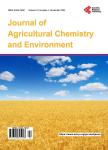Pyroclastic material from the Puyehue-Cordon-Caulle Volcanic Complex, Chile, as carrier of Beauveria bassiana conidia: Potential utilization in mycoinsecticide formulations
Pyroclastic material from the Puyehue-Cordon-Caulle Volcanic Complex, Chile, as carrier of Beauveria bassiana conidia: Potential utilization in mycoinsecticide formulations作者机构:CEQUINOR (CCT-La Plata-CONICET-UNLP) La Plata Argentina INREMI (CICPBA-UNLP) La Plata Argentina Instituto Spegazzini (UNLP) La Plata Argentina
出 版 物:《Journal of Agricultural Chemistry and Environment》 (农业化学和环境(英文))
年 卷 期:2014年第3卷第1期
页 面:14-21页
学科分类:1002[医学-临床医学] 100214[医学-肿瘤学] 10[医学]
主 题:Volcanic Material Bioinsecticide Entomopathogenic Fungi Viability Vehicle
摘 要:The last volcanic eruption of the Puyehue-Cordon-Caulle Volcanic Complex in the Andes cordillera of western South America, occurring on 4 June 2011, ejected pyroclastic materials that were accumulated in a wide region of the northern Patagonia (Argentina), affecting the environment and health of residents within the area. The aim of this work was to evaluate the practicability of using this waste material as a lowcost carrier for mycopesticide formulations. Beauveria bassiana is a recognized fungal agent for arthropod biologic control. Lengthy storage is critical for the development of mycoinsecticide formulations. Accordingly, the search for adequate materials to improve the shelf life of biocontrol products becomes desirable. First, several analytical techniques were employed to characterize the pyroclast physicochemically;then the viability of the fungal conidia was evaluated after an 18-month storage in the volcanic material. Finally, the pathogenicity of the conidia after that prolonged maintenance in the vehicle was assessed on the beetle Alphitobius diaperinus, an insect pest in poultry houses that causes major economic losses. The results from those bioassays proved auspicious for the eventual utilization of the pyroclast as a bioinsecticide carrier especially since the formulation had proven to be stable for at least 18 months under a wide range of environmental conditions. The constant moisture in a closed environment within a 5°C - 40°C temperature range insures a viable state during storage. The results indicate that what would otherwise be volcanic waste may be utilized as an efficient, abundant, inexpensive, and environmentally innocuous carrier of entomopathogenic fungi.



